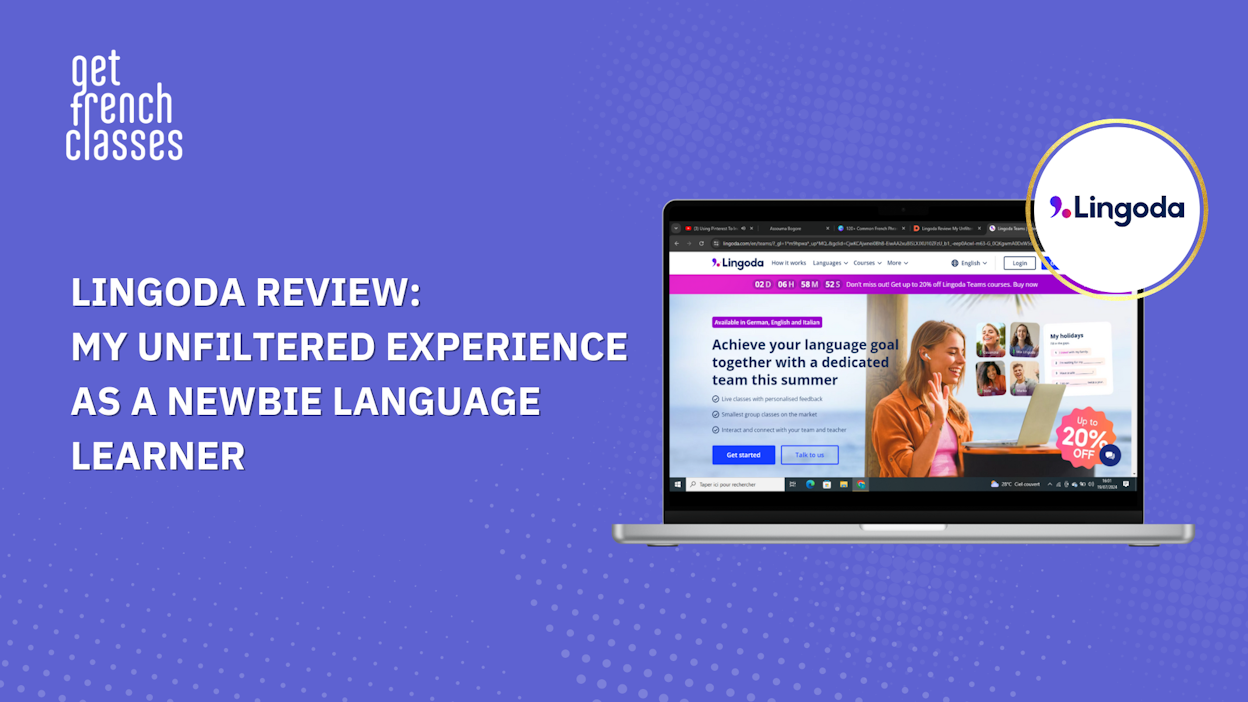So, I decided to learn Spanish and thought, "Hey, why not try this online platform everyone's talking about?" I jumped into Lingoda and, for good measure, used iTalki on the side too.
In this Lingoda review, I'll share my experience and how I think Lingoda compares against other language learning apps like Duolingo and Babbel.
What is Lingoda and what's their promise?
When I first stumbled upon Lingoda, I wasn't quite sure what to make of it. Is it a language school? An online tutoring platform? After diving deep into their offerings, I realized it's a bit of both, and that's what makes it unique.
Here's the deal: Lingoda offers group classes and intensive "sprints," but they don't just connect you with random tutors. Instead, they've built a team of language instructors and equipped them with standardized teaching materials.
It's like they've taken the best parts of a structured language school and combined them with the flexibility of online tutoring.
What really struck me is how Lingoda positions itself in terms of responsibility. Unlike platforms where tutors are entirely independent, Lingoda takes on about 50% of the accountability for your learning experience. The other 50%? That's on the tutors.
This shared responsibility model gave me a sense of security; I felt like there was a system in place to ensure quality.
Now, let's talk about their promise. Brace yourself, because it's a bold one.
Lingoda claims they can take you from a complete beginner to a confident, fluent speaker. They even dangle the carrot of official language certificates aligned with the Common European Framework (CEFR).
I have to admit, when I first read this, I was skeptical. We've all seen online language learning platforms make big promises before, right? But as I dug deeper into Lingoda's methodology, I started to see how they aim to deliver on this promise.
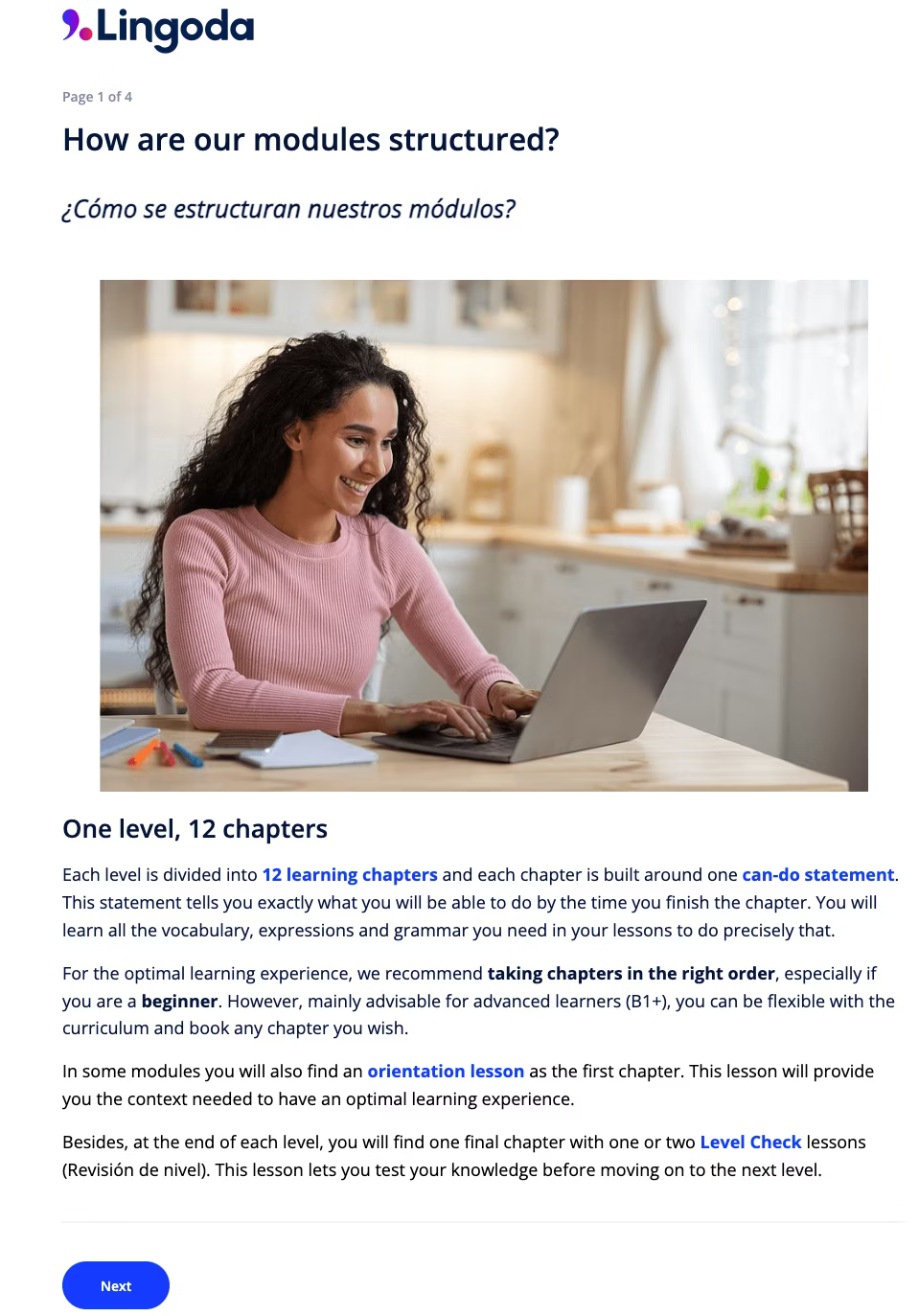
Their secret sauce is a combination of 24/7 live classes with native speakers, small group sizes (never more than 5 students), and those intensive "sprint" programs I mentioned earlier. It's designed to immerse you in the language and push you to make rapid progress.
But here's the kicker – and something you should keep in mind: While Lingoda provides the structure and the tools, a significant part of their promise relies on your commitment. They're not claiming to work miracles; they're offering a path to fluency that requires your active participation.
How much does Lingoda cost?
When I first looked into Lingoda, I was a bit overwhelmed by the pricing structure.
Lingoda offers both group and private classes, and the pricing varies significantly between the two. Let's start with the group classes, which are the more budget-friendly option.
Group Classes:
-
5 classes per month: $79.99 ($16 per class)
-
12 classes per month: $159.99 ($13.5 per class)
-
20 classes per month: $229.99 ($11.5 per class)
-
40 classes per month: $429.99 ($10.5 per class)
As you can see, the more classes you commit to, the less you pay per class. If you're just dipping your toes in, the 5-class option might be appealing. But if you're serious about making progress, that 40-class option offers the best value per class.
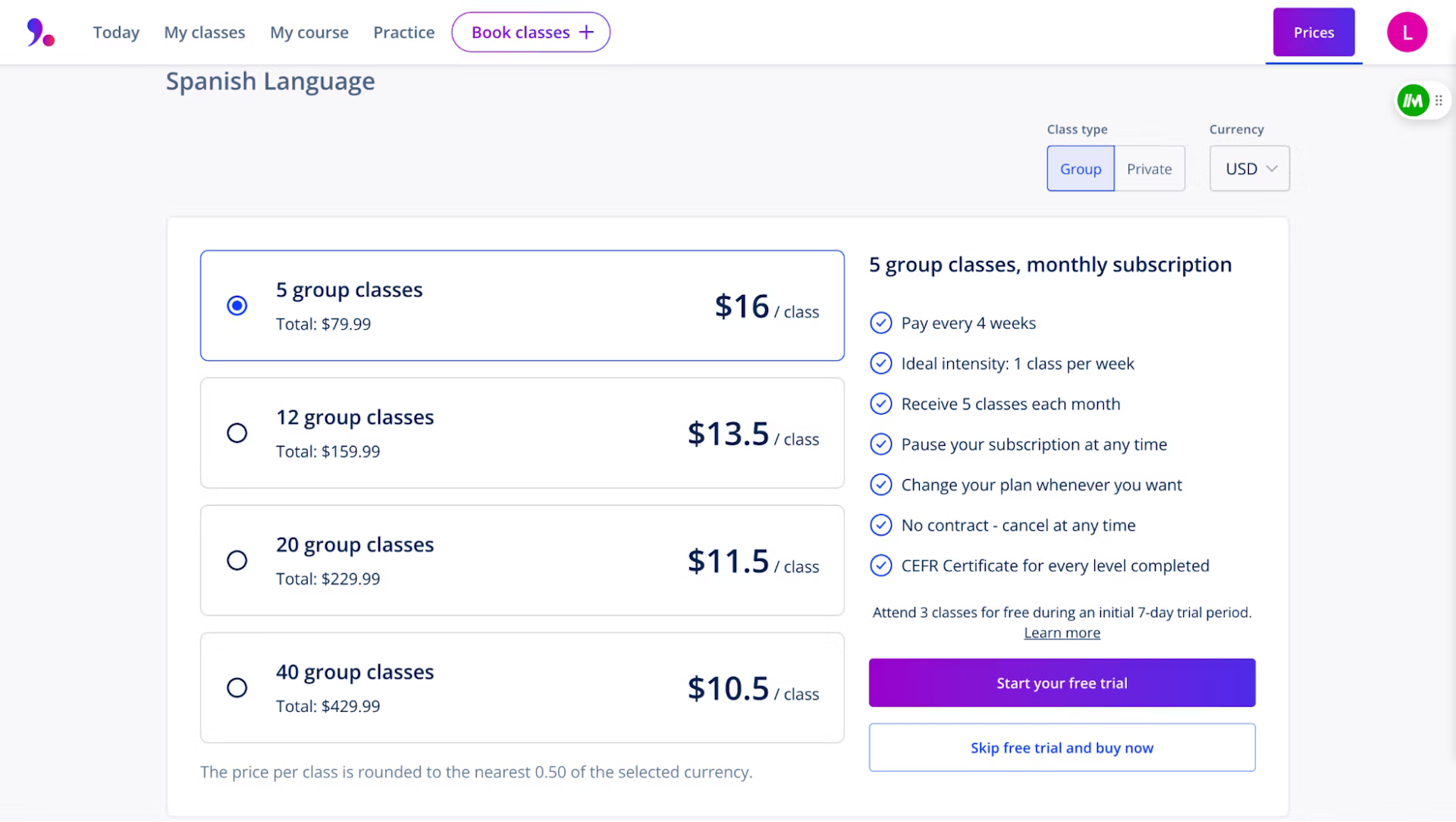
Now, let's look at the private classes:
Private Classes:
-
5 classes per month: $184.99 ($37 per class)
-
12 classes per month: $369.99 ($31 per class)
-
20 classes per month: $509.99 ($25.5 per class)
-
40 classes per month: $899.99 ($22.5 per class)
Whew! That's a significant jump from the group class prices. But here's the thing – you're getting undivided attention from your instructor for a full hour.
In my experience, this can dramatically accelerate your learning, especially if you have specific areas you want to focus on.
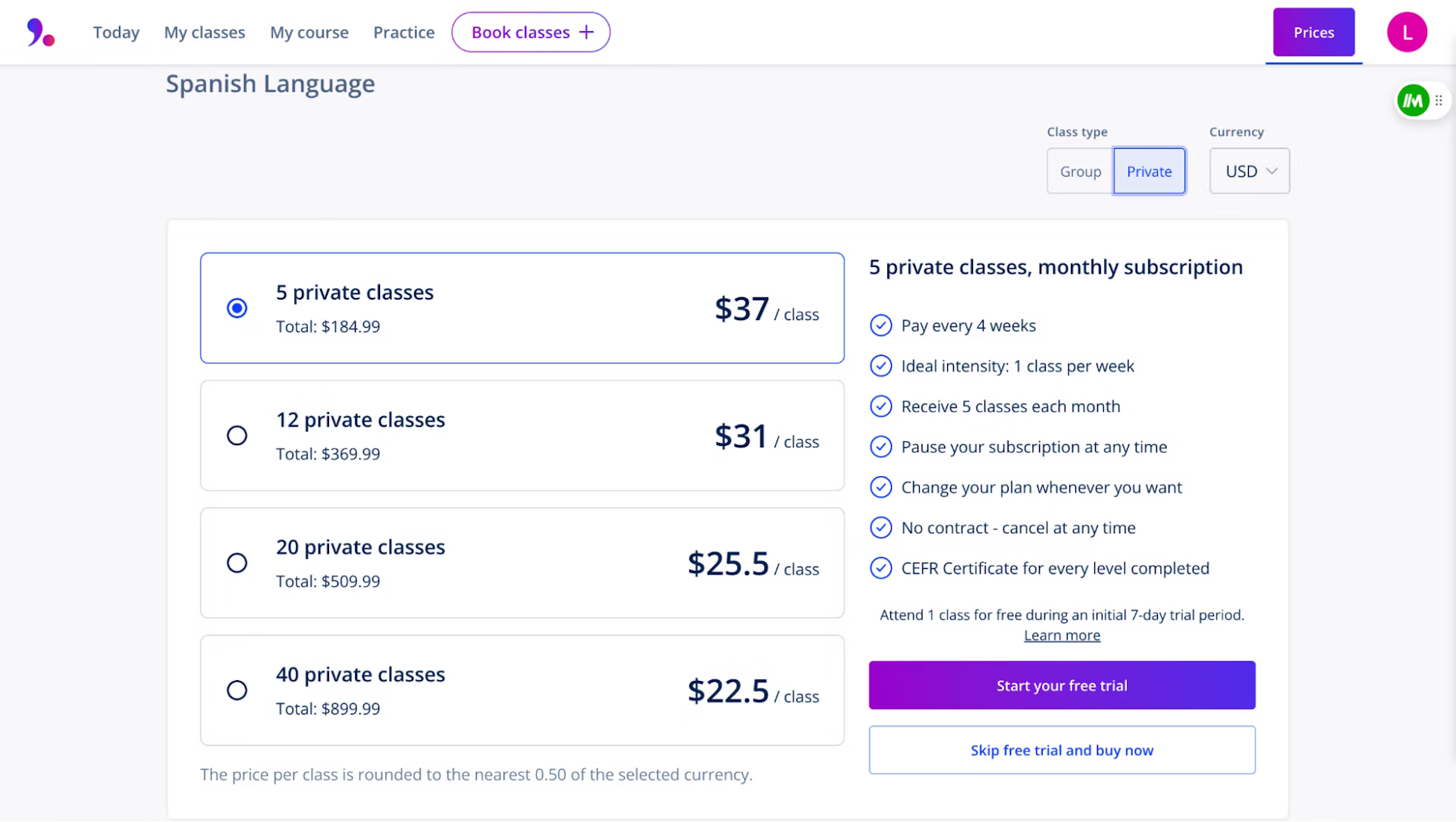
Now, you might be wondering, "Is it worth paying more than double for private classes?"
Here's my take:
If you're a beginner or at an intermediate level, group classes can be incredibly valuable. You benefit from hearing other students' questions and mistakes, and the group dynamic makes classes more fun and engaging.
Plus, the lower price point means you can afford more classes, giving you more exposure to the language.
On the other hand, if you're at an advanced level, struggling with specific aspects of the language, or if you have an urgent need to improve quickly (like for a job or a move abroad), private classes could be worth the investment. The personalized attention allows you to progress much faster.
One thing I love about Lingoda is the flexibility. All plans are billed monthly, and you can pause or cancel your subscription at any time. You can even switch between plans if you find you need more or fewer classes.
And here's a pro tip: Lingoda offers a free trial period. For group classes, you can attend 3 classes for free over 7 days. For private classes, you get 1 free class. This is a great way to test the waters before committing to a plan.
How does Lingoda work?
After spending considerable time on the Lingoda platform, I've got to say, their system is pretty well thought out. Let me break down the key components for you, based on my experience.
24/7 live classes
One of the first things that caught my eye was Lingoda's promise of round-the-clock availability. And you know what? They actually deliver on this.
I tested it out by trying to book classes at some truly odd hours, and sure enough, there were options available.
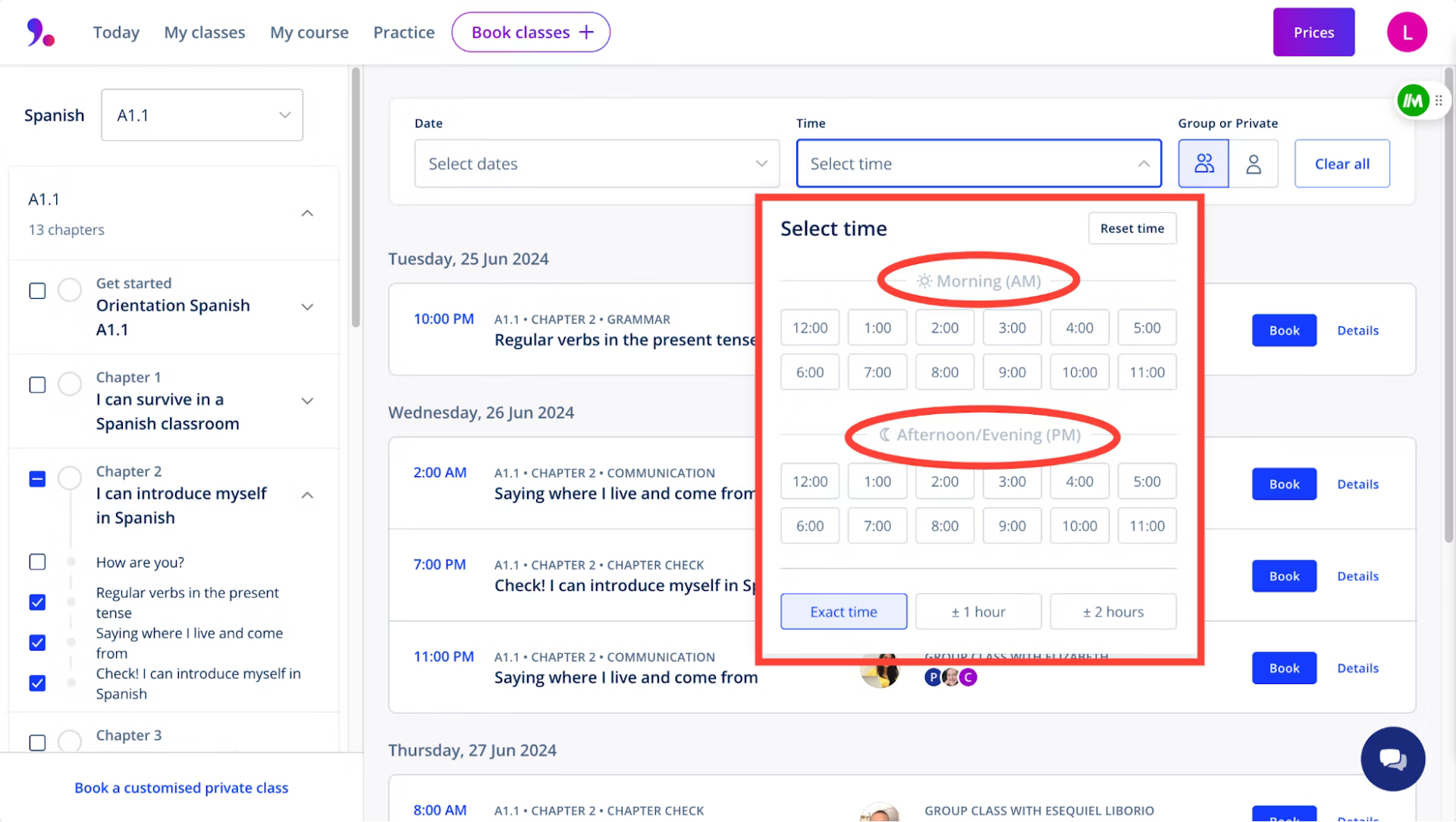
Whether you're an early bird or a night owl, you'll find a class that fits your schedule. This flexibility was a game-changer for me, especially when juggling work and other commitments.
The classes themselves are 60 minutes long, which I found to be just right - long enough to dive deep into a topic, but not so long that my attention started to wander.
Native speakers as instructors
Lingoda makes a big deal about all their instructors being native speakers, and after taking several classes, I can confirm this is true.
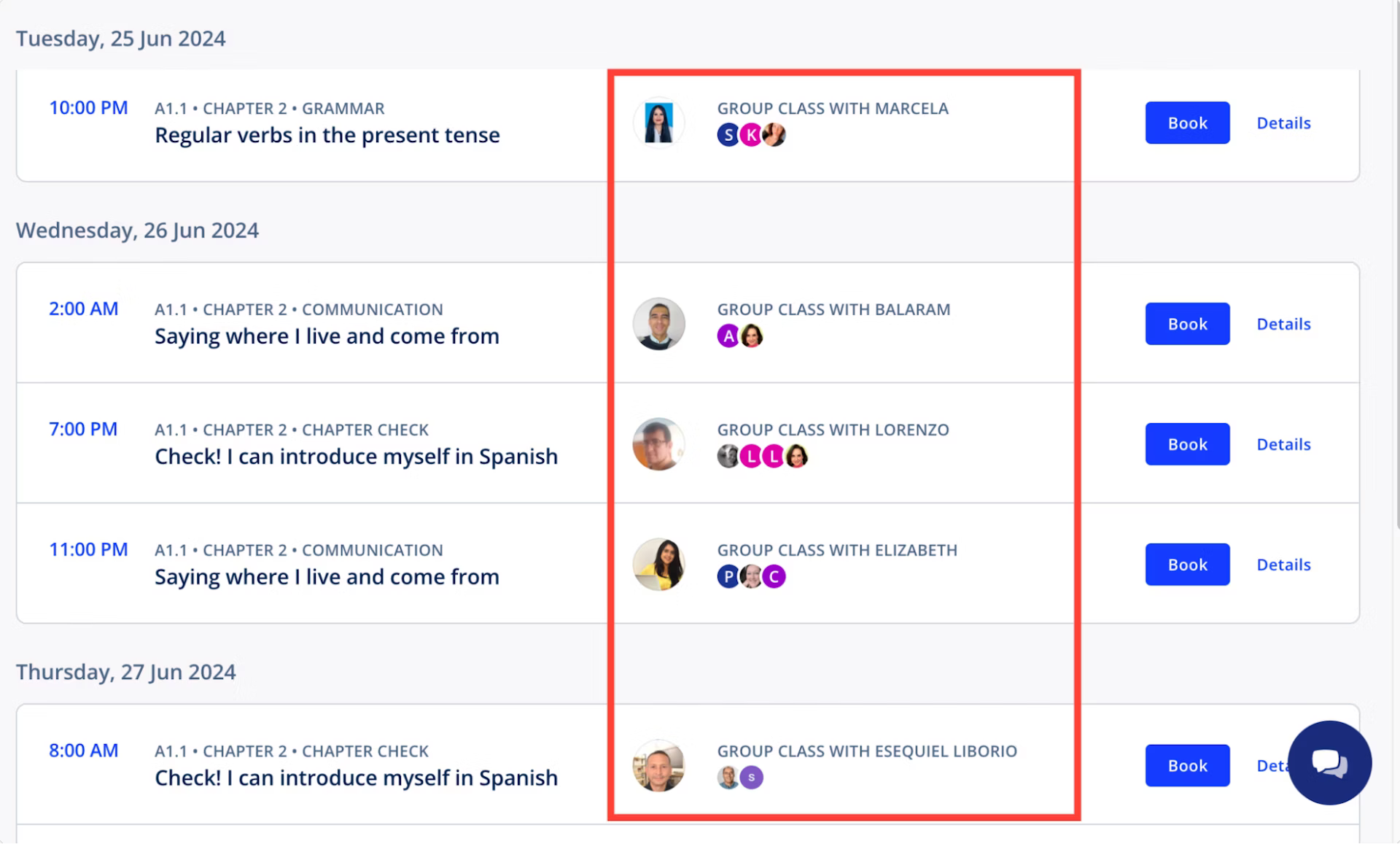
It's not just about the accent (though that certainly helps with pronunciation practice). What I really appreciated were the cultural insights these qualified teachers brought to the lessons.
For instance, during a Spanish class, my instructor from Mexico shared some local idioms that you'd never find in a textbook. It's these little touches that make the language come alive.
However, I did notice that the teaching style can vary quite a bit from instructor to instructor. Some were more interactive, while others stuck closely to the prepared materials. It's worth trying a few different teachers to find the style that works best for you.
Group classes
Lingoda's group classes are capped at 5 students, which I found to be a sweet spot. It's small enough that you get plenty of speaking time, and large enough to benefit from other students' questions and perspectives.
In my experience, the average class size was around 3-4 students. There were a couple of times when I ended up being the only student , effectively getting a private lesson for the price of a group class—talk about a bonus!
Course structure and materials
Lingoda's curriculum is aligned with the Common European Framework of Reference for Languages (CEFR), which gives a nice structure to the learning path.
You start with a placement test to determine your level, and then progress through the levels from A1 (beginner) to C1 (advanced).
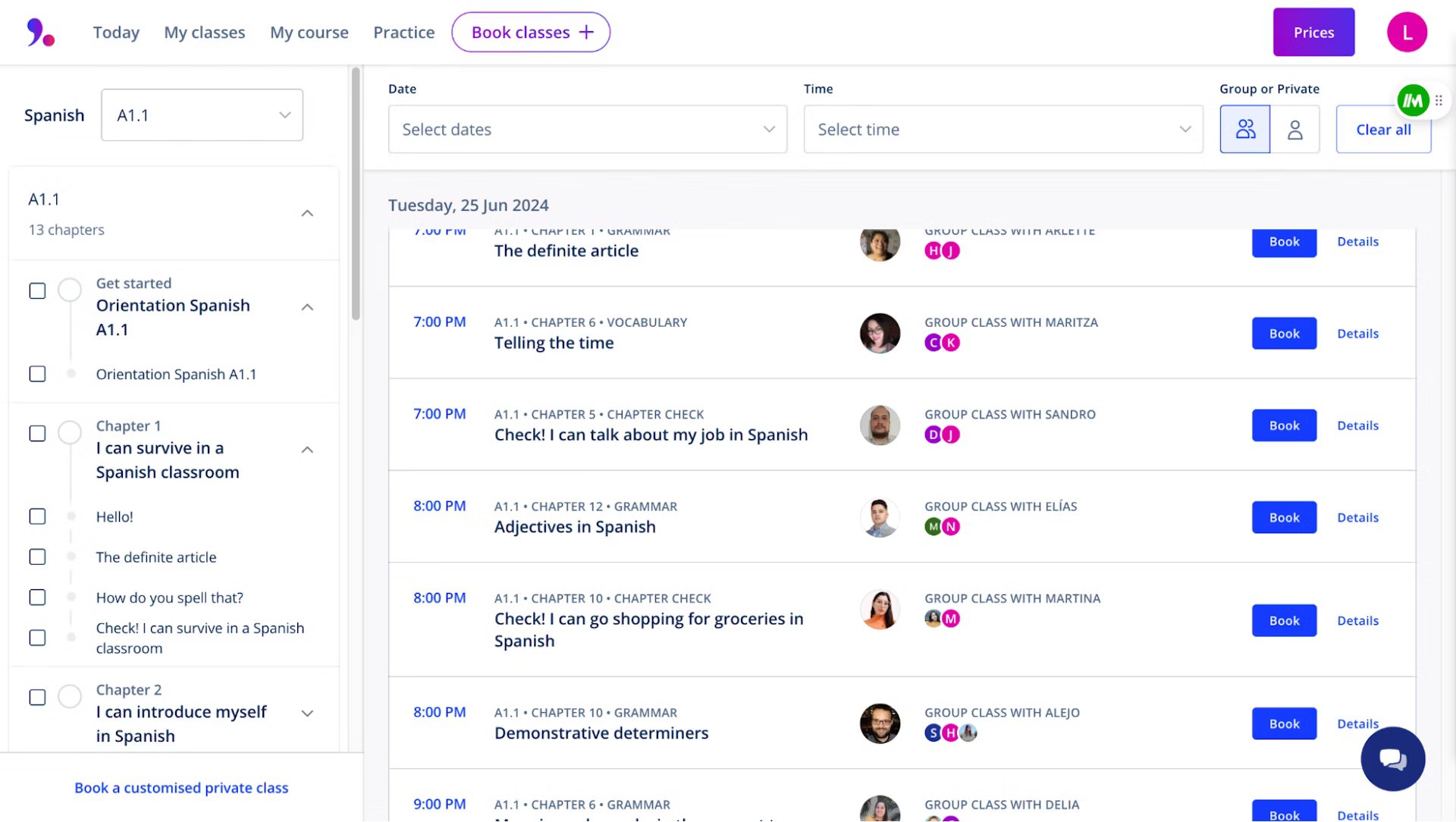
Each level is broken down into units, and each unit consists of several classes focusing on different skills: speaking, listening, reading, and writing. I appreciated this balanced approach.
Before each class, you have access to a PDF with the lesson materials. I found it helpful to review these in advance, especially for grammar-heavy lessons.
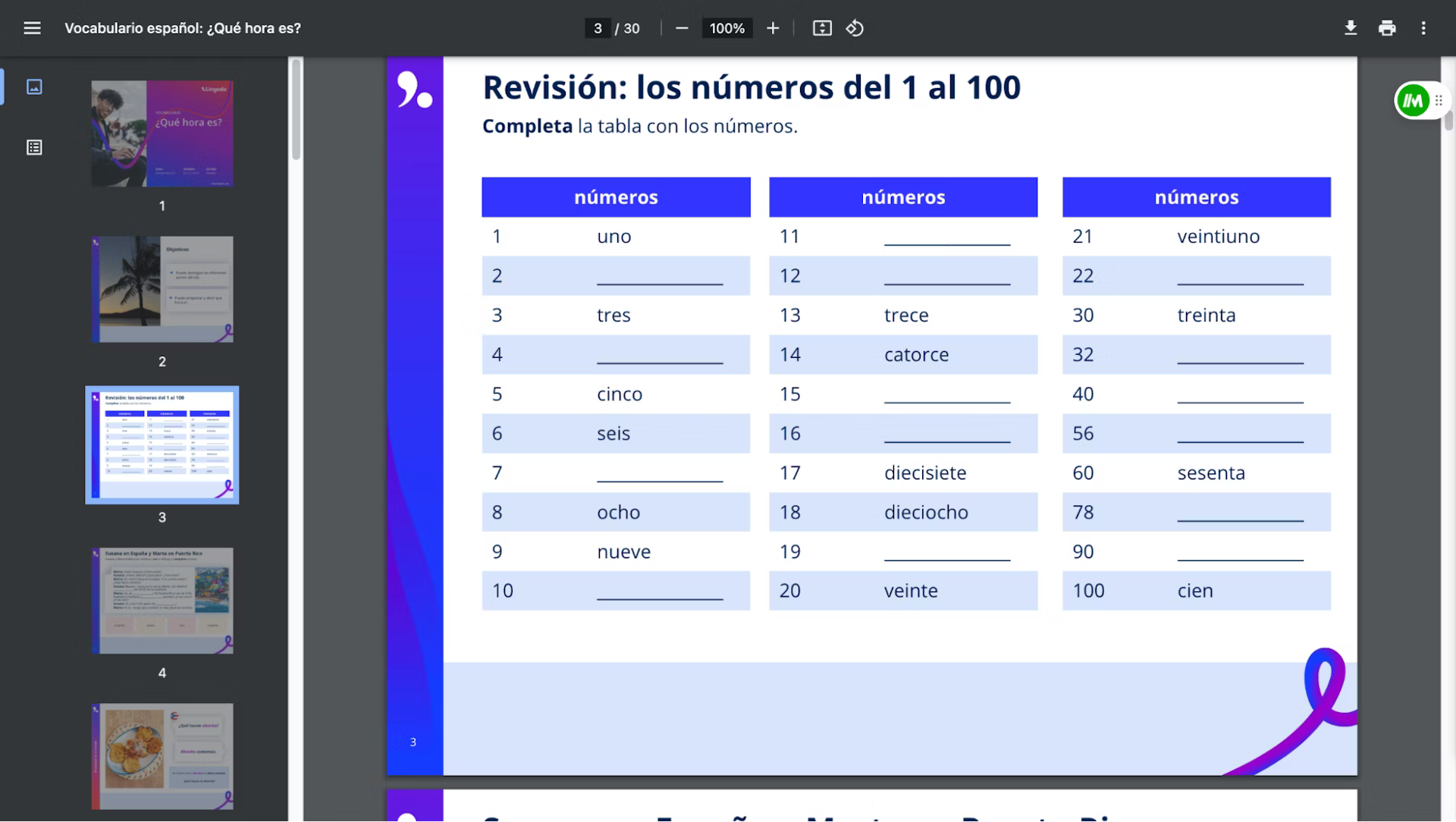
During the class, the teacher shares their screen with these materials, guiding the lesson.
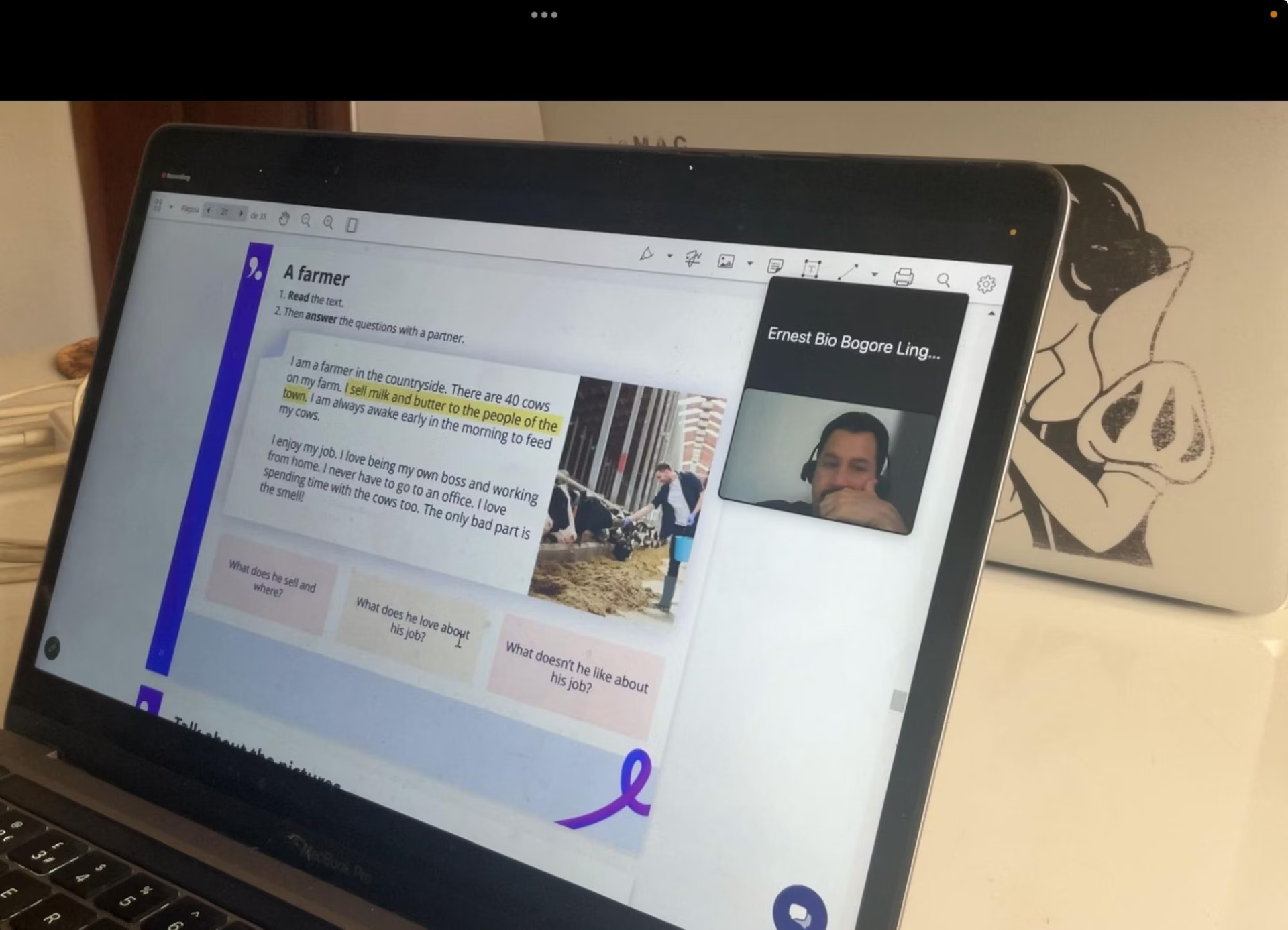
One thing to note: while the materials are comprehensive, they can sometimes feel a bit dry. The best classes I experienced were when the teacher used these as a jumping-off point for more dynamic conversations and activities.
After each class, you can access additional exercises and quizzes to reinforce what you've learned. I found these to be hit or miss—some were really useful, others felt a bit repetitive.
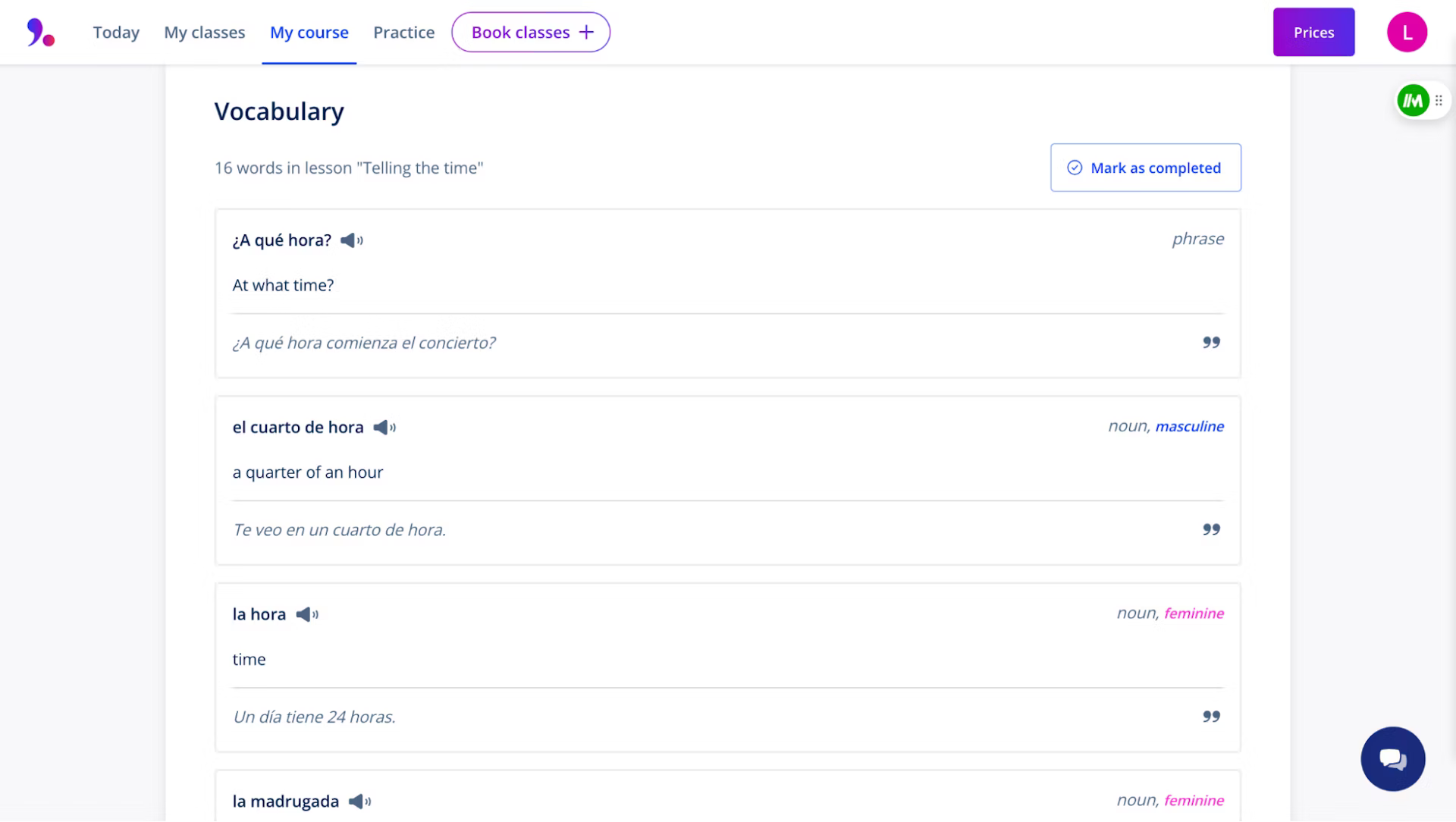
What criteria are we testing Lingoda against?
When I decided to put Lingoda through its paces, I wanted to be thorough. After all, if I'm recommending this to you, I need to make sure it's worth your time and money.
So, I defined a set of criteria to evaluate different aspects of the Lingoda experience. Let me break it down for you:
-
Quality of the Lingoda Materials
First things first, I wanted to scrutinize the learning materials. Are they comprehensive? Well-structured? Engaging? I've seen my fair share of dull language workbooks, so I was keen to see if Lingoda could do better.
I looked at:
-
The range of topics covered
-
How well the materials build on each other
-
The balance between grammar, vocabulary, and practical usage
-
The relevance of the content to real-world situations
-
Lingoda Group Classes
Next, I looked into the group classes. With a maximum of 5 students, I was curious to see how these would play out.
I evaluated:
-
The dynamics of the classes
-
How much speaking time each student gets
-
The effectiveness of peer learning
-
The teacher's ability to manage different skill levels in one class
-
Lingoda Private Classes
Then, I tried out the private classes. These come at a premium, so I had high expectations.
I assessed:
-
The level of personalization
-
How well the teacher adapted to my learning style
-
The amount of speaking practice
-
The depth of feedback provided
-
Lingoda Certificates
Finally, I investigated the CEFR certificates that Lingoda offers. These could be valuable for professional or academic purposes, so I wanted to understand their worth.
I considered:
-
The process of earning a certificate
-
How Lingoda's certificates compare to other language certificates
-
The recognition of these certificates in academic or professional settings
Throughout my experience with Lingoda, I kept these criteria in mind, constantly asking myself: "Is this helping me learn effectively? Is it worth the cost? How does it compare to other online language learning methods I've tried?"
In the following sections, I'll dive deep into each of these areas, sharing my honest thoughts on where Lingoda shines and where it could use some improvement.
Lingoda pros and cons: What I like about Lingoda? And in what scenarios I wouldn't use Lingoda?

Quality of the Lingoda Materials
Pros
The comprehensiveness of Lingoda's curriculum truly impressed me. From basic greetings to complex discussions on global issues, the materials cover a wide spectrum of topics.
For instance, in my Spanish course, we moved seamlessly from casual conversations about daily routines to more nuanced discussions about environmental policies in Latin America.
I particularly appreciated how the materials align with CEFR levels, providing a clear sense of progression.
This structure allowed me to track my improvement tangibly, moving from A2 to B1 over several months. The real-world relevance of the content stood out as well.
Many dialogues and exercises are based on practical situations you'd encounter in a Spanish-speaking country, which I found invaluable when I later traveled to Mexico and could confidently navigate everyday interactions.
Cons
At times, the content felt overly academic and dry, lacking the engagement factor that keeps learning fun and interesting.
For example, some grammar exercises, while thorough, were repetitive and failed to contextualize the rules in memorable ways.
Also, the rigid curriculum structure, while comprehensive, sometimes felt inflexible. There were occasions when I wanted to look more into a topic that particularly interested me, like Spanish cinema, but the course materials didn't allow for such personalization.
Furthermore, I noticed occasional errors in the materials - nothing major, but small typos or outdated information that momentarily disrupted the learning flow. These minor issues, while not deal-breakers, did sometimes impact my learning experience.
Lingoda Group Classes
Pros
The small class sizes in Lingoda's group sessions create an intimate learning environment that I found highly effective.
I always had ample opportunity to practice speaking and receive individual attention from the instructor.
I recall one class where there were only three students. It allowed us to have an in-depth discussion about cultural differences that significantly improved my conversational skills.
The diversity of my classmates added an unexpected but welcome dimension to my learning. In a single class, I might interact with a businesswoman from Japan, a student from Brazil, and a retiree from Germany—all of us united in our goal to learn Spanish.
This international atmosphere not only made classes more interesting but also prepared me for real-world interactions with Spanish speakers from various backgrounds.
Cons
The quality of each session can vary significantly depending on the mix of students. I experienced classes where the disparity in language levels was noticeable, leading to pacing issues.
In one instance, advanced learners dominated the conversation, leaving less time for us newcomers to practice.
Technical problems occasionally disrupted the flow of lessons. Unstable internet connections or audio issues sometimes led to fragmented conversations or missed explanations. While these were usually resolved quickly, they did impact the overall learning experience.
Moreover, the group setting, while beneficial in many ways, sometimes limited the depth of discussions.
There were moments when I wanted to explore a topic further, but the need to adhere to the lesson plan and ensure equal participation meant interesting tangents were cut short. This occasionally left me feeling that I had missed out on valuable learning opportunities.
Lingoda Private Classes
Pros
The one-on-one attention in Lingoda's private classes offers an unparalleled level of personalization.
During my sessions, instructors tailored the pace and content to my specific needs, allowing me to focus on areas where I struggled most.
For instance, when I expressed difficulty with the subjunctive mood in Spanish, my teacher devoted extra time to this concept, providing additional examples and exercises until I felt comfortable.
The flexibility to dictate the direction of each lesson is another significant advantage. In one class, I was able to spend the entire hour practicing a presentation for an upcoming work meeting in Spanish.
The instructor not only helped me refine my language but also offered cultural insights that improved my delivery style for a Spanish-speaking audience.
Cons
The higher cost of private classes is a substantial drawback.
While personalized attention is valuable, the price point is just too high for many language learners, especially those on a tight budget or looking for long-term language study. I found myself constantly weighing the benefits against the financial investment.
Also, the lack of peer interaction in private classes means missing out on the diverse perspectives and group dynamics that can enhance online language learning.
There were times when I missed the camaraderie and shared learning experience of group classes, particularly when practicing dialogue or discussing cultural topics.
Lingoda Certificates
Pros
The CEFR-aligned certificates offered by Lingoda provide tangible proof of language proficiency, which can be valuable for academic or professional purposes.
When I completed the B1 level in Spanish, receiving the certificate gave me a sense of accomplishment and motivation to continue to higher levels.
The recognition of these certificates by many institutions adds to their value; a colleague successfully used her Lingoda certificate as part of her application for a study abroad program.
The process of earning certificates is integrated seamlessly into the course structure, meaning you're working towards certification as you learn, rather than studying separately for a test. This approach felt more natural and less stressful than preparing for standalone language exams.
Cons
While valuable, the Lingoda certificates may not carry the same weight as more established language certifications like DELE for Spanish or DALF for French.
When exploring job opportunities that required proof of language skills, I found that some employers were unfamiliar with Lingoda certificates and preferred these more widely recognized qualifications.
The all-or-nothing nature of the certification process can also be frustrating. To earn a certificate, you need to complete a certain percentage of classes at a given level. If you fall short by even one or two classes, you miss out on the certification, which can feel disheartening given the time and financial investment.
This strict requirement doesn't always reflect the nuanced nature of language acquisition, where skills may develop unevenly across different areas.
To be fair, it just proves that Lingoda doesn't want to reward laziness and lack of commitment.
But the main issue I see with this certification is that it is given to anyone who completes the language courses, versus to people who took an exam and proved they actually have said levels.
Lingoda vs. language learning apps (Duolingo, Babbel, etc.)
After extensively using Lingoda and popular language learning apps like Duolingo and Babbel, I can confidently say that despite its shortcomings, Lingoda offers a more effective approach to language acquisition.

While apps have their place in the language learning journey, Lingoda's model provides distinct advantages that set it apart from its app-based counterparts.
Lingoda's core strength lies in its live, interactive classes with native speakers. This approach closely simulates real-world language use, something that apps simply cannot replicate.
During my Lingoda classes, I found myself actively speaking the target language from day one, a stark contrast to the passive learning experience offered by most apps. This immersive approach helped me develop confidence in using the language much faster than I ever did with apps alone.
One of the most significant advantages of Lingoda over apps is its focus on practical, contextual learning. While Duolingo might have you translating quirky sentences like "The elephant is driving a car," Lingoda's curriculum is designed around real-life scenarios you're likely to encounter.
Furthermore, Lingoda's live classes provide immediate feedback and corrections from native speakers. This real-time interaction is invaluable for improving pronunciation and understanding nuances that apps often miss.
I remember a Spanish class where the teacher explained the subtle differences in using "por" and "para" – a distinction that had always confused me when using online language learning app but became clear through our interactive discussion.
That said, language-learning apps do have their merits. They excel at building daily habits and providing bite-sized lessons that fit easily into busy schedules.
Duolingo's gamification, for instance, can be highly motivating for some language learners. Babbel offers a more structured curriculum than Duolingo, which can be beneficial for self-study learners.
However, where these apps fall short is in preparing learners for real-life conversations. They often create a false sense of progress, where users rack up points and maintain streaks without actually improving their ability to communicate effectively in the target language.
I've experienced this firsthand—feeling accomplished after completing numerous Duolingo lessons, only to freeze up when trying to have a simple conversation with a native speaker.
Lingoda, on the other hand, pushes you out of your comfort zone and into actual conversation from the start. Yes, it can be more challenging and even intimidating at times, but it's this very challenge that accelerates learning and builds real-world language skills.
In terms of cultural understanding, Lingoda again has the upper hand. Through interaction with native-speaking teachers from various backgrounds, learners gain insights into cultural nuances and colloquial expressions that a language learning app often miss or present without context.
While Lingoda is more expensive than most language learning apps, the investment pays off in terms of the quality and depth of learning.
It's not just about memorizing vocabulary or completing grammar exercises; it's about developing the ability to think in the target language and communicate naturally.
Get French Classes: A better Lingoda alternative if you’re learning French
The most glaring issue with Lingoda is the cost of private classes, which can quickly become prohibitively expensive for many learners. On the other hand, their group classes, while more affordable, often fall short of providing the intensive practice needed to achieve true fluency.
Moreover, Lingoda lacks a structured learning plan, leaving many students feeling directionless in their studies.
The inability to communicate with tutors outside of scheduled classes further limits your opportunities for clarification and guidance. Perhaps most critically, there's a noticeable lack of practice opportunities beyond the live classes, which can slow down your progress significantly. Do you need private or group classes to reach learning objectives?
This is where Get French Classes steps in as a better alternative, addressing these pain points head-on.

We've designed our program to offer a comprehensive, immersive French learning experience at a fraction of the cost of traditional methods.
With Get French Classes, you get a perfect blend of private classes, group sessions, and video lessons.
Our private classes focus on intensive practice with native speakers, providing you with real-time feedback and personalized attention. This one-on-one interaction is crucial for rapid improvement and confidence-building.
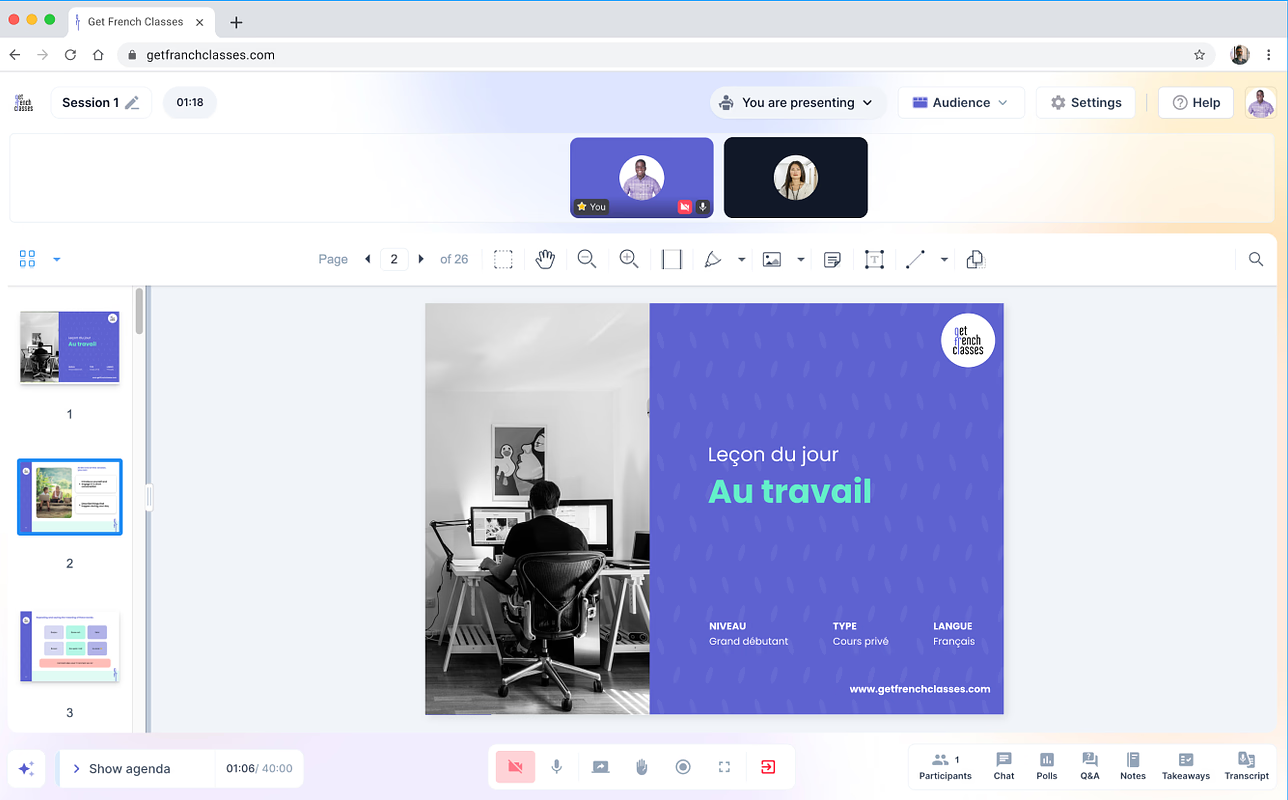
To combat the common issue of "I understand when you talk, but can't speak" or "I don't have anyone to speak with," we've incorporated regular group classes.
These sessions allow you to practice, debate, and navigate real-life scenarios with fellow learners, solidifying your speaking skills in a supportive environment.
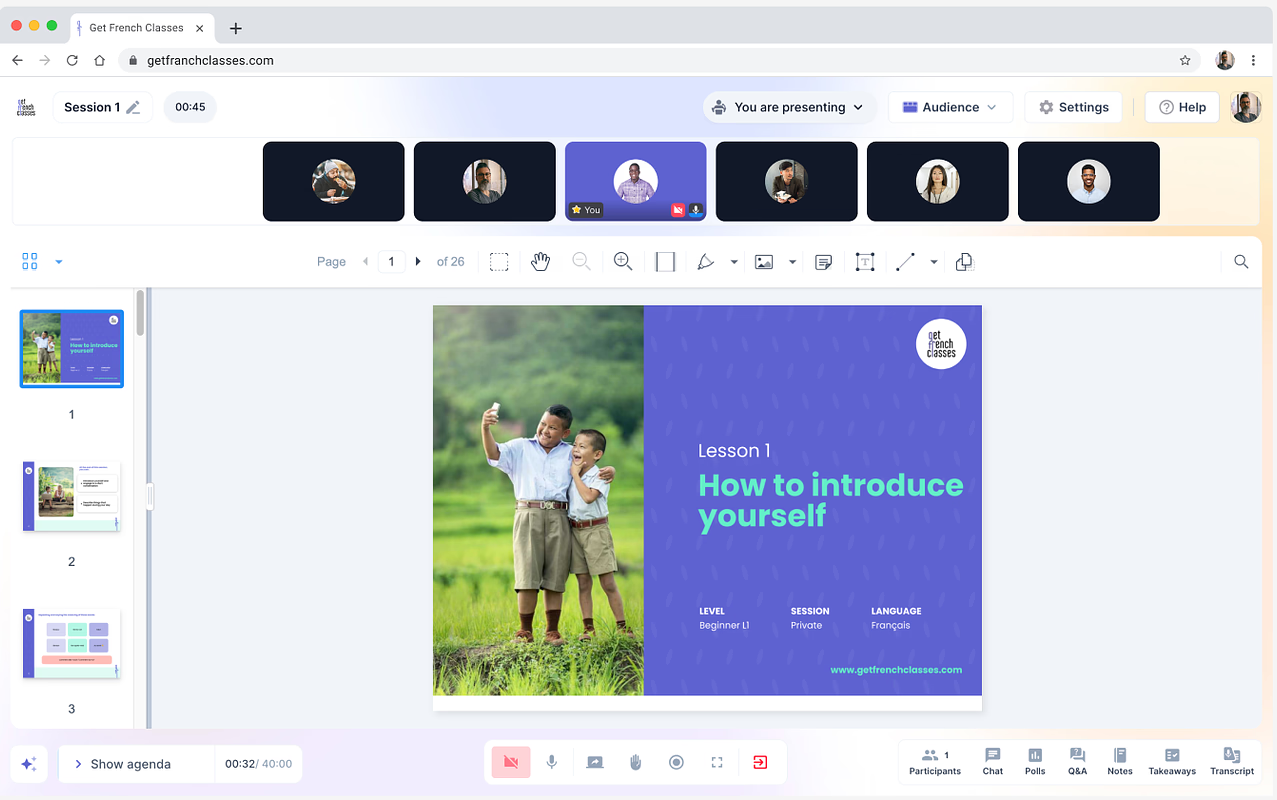
Beyond the live classes, our vibrant community serves as a daily resource where you can seek help from both peers and tutors. This constant access to support ensures you're never left struggling alone with a difficult concept or pronunciation.
A standout feature of our program is the daily video lessons.
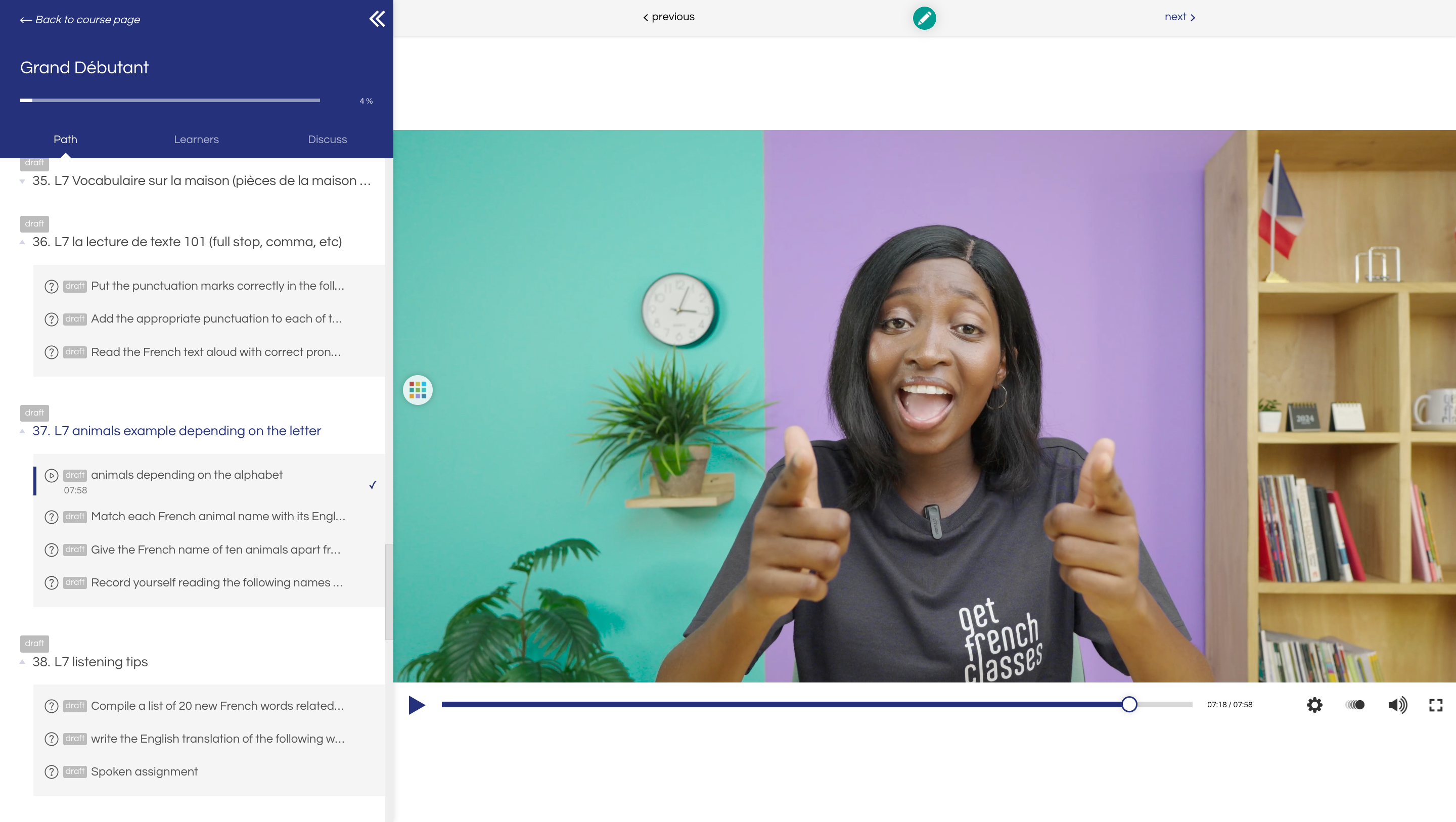
Each lesson comes with both written and speaking assignments, helping you build a daily habit of engaging with French, even outside of live classes.
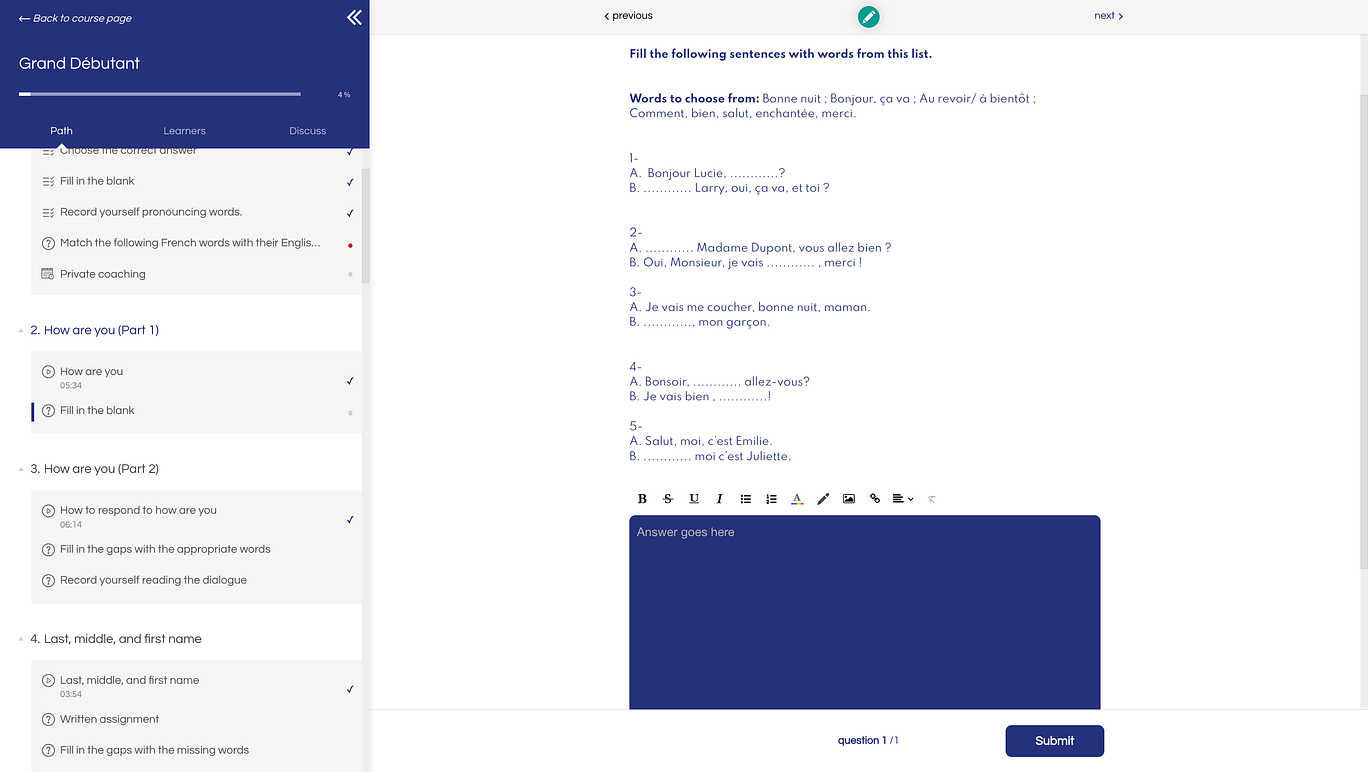
This consistent practice is key to ingraining the language and achieving fluency faster.
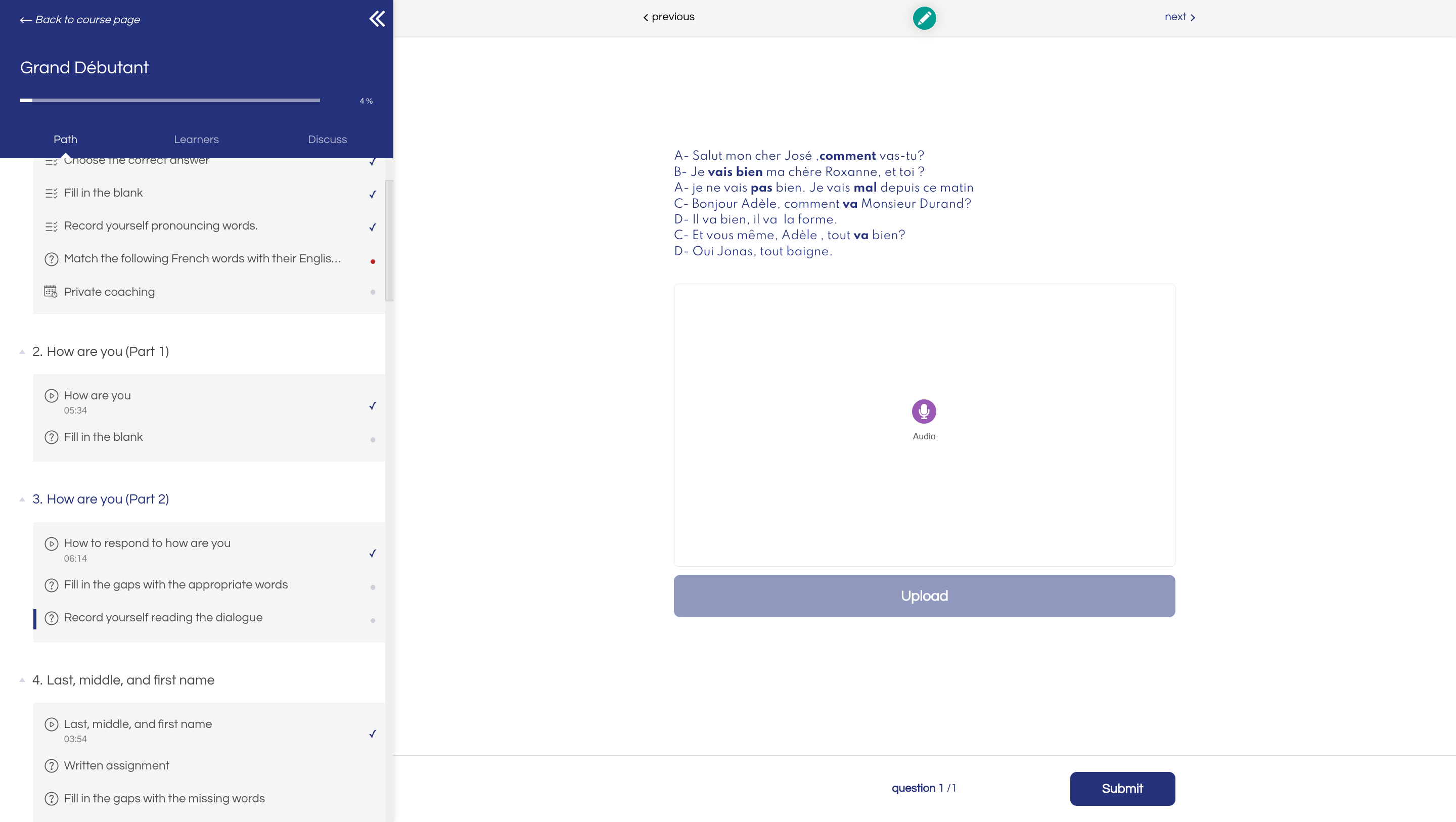
Now, here's the kicker - all of this is available for just $307. This comprehensive package includes:
-
50+ video lessons (5 minutes each)
-
100+ exercises, writing and speaking
-
6 hours of private classes
-
6 hours of group classes
-
Access to our supportive community
To put this in perspective, let's compare it to Lingoda's pricing.
With Lingoda, 6 hours of private classes alone could cost you around $222, depending on your plan. Add in the equivalent group classes, and you're looking at an additional $100.
That's over $320 for just the live classes, without any of the additional resources and daily practice materials that Get French Classes provides.
With Get French Classes, you're not just saving money—you're investing in a more comprehensive, structured, and effective learning experience. Our approach ensures you're consistently practicing and improving, setting you on the fast track to French fluency.
Here's some of our tutors:
As well, we take certification seriously. Unlike some programs that offer certificates simply for completing a course, we believe in certifying real proficiency. That's why we offer CEFR-level certificates, but these aren't just handed out—they're earned.
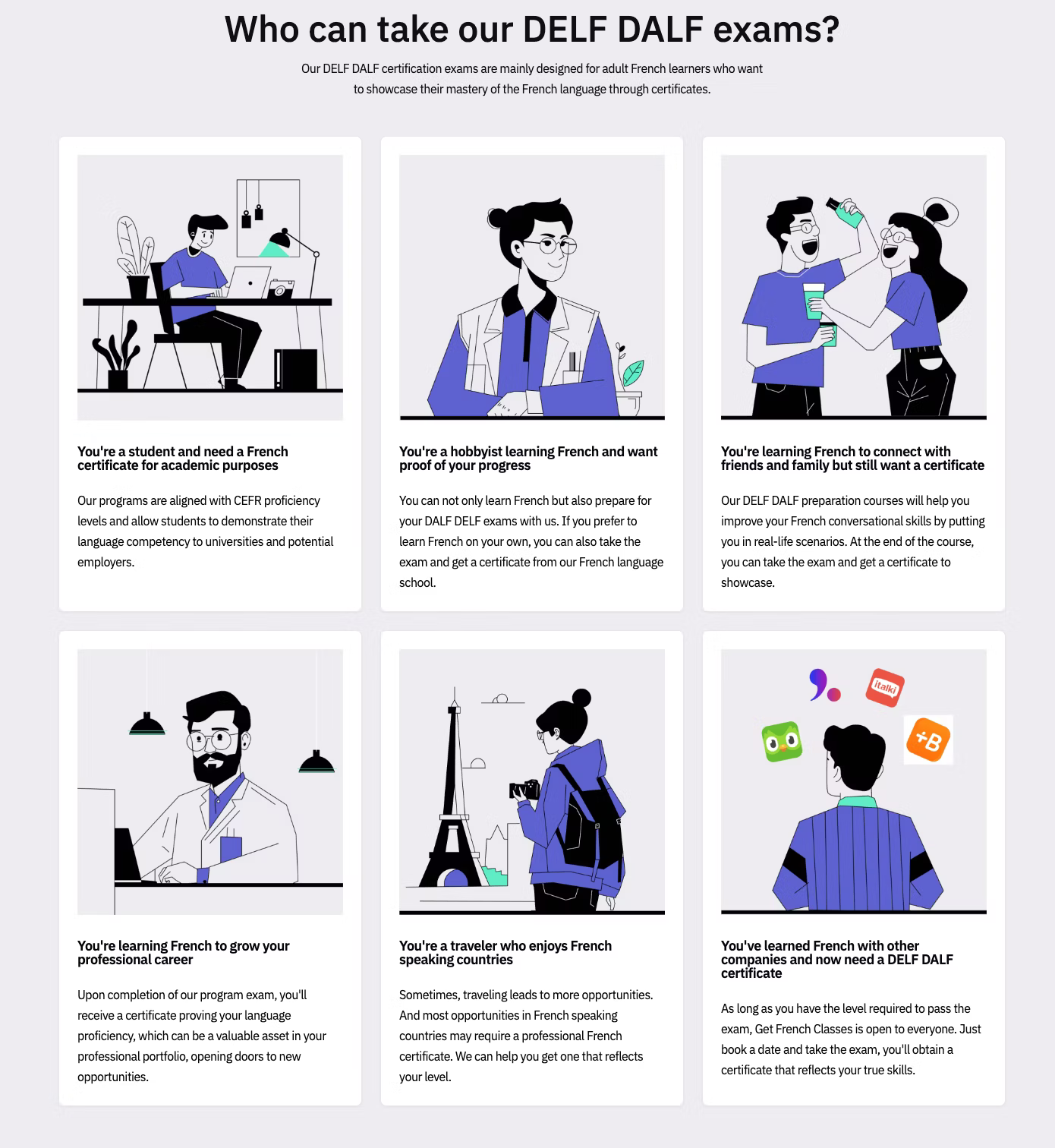
To receive a certificate from Get French Classes, you must take our DELF/DALF exams. These exams are rigorous and comprehensive, testing your French skills across reading, writing, listening, and speaking. Depending on your score, you'll receive a certificate that accurately reflects your CEFR level - be it A1, A2, B1, B2, C1, or C2.
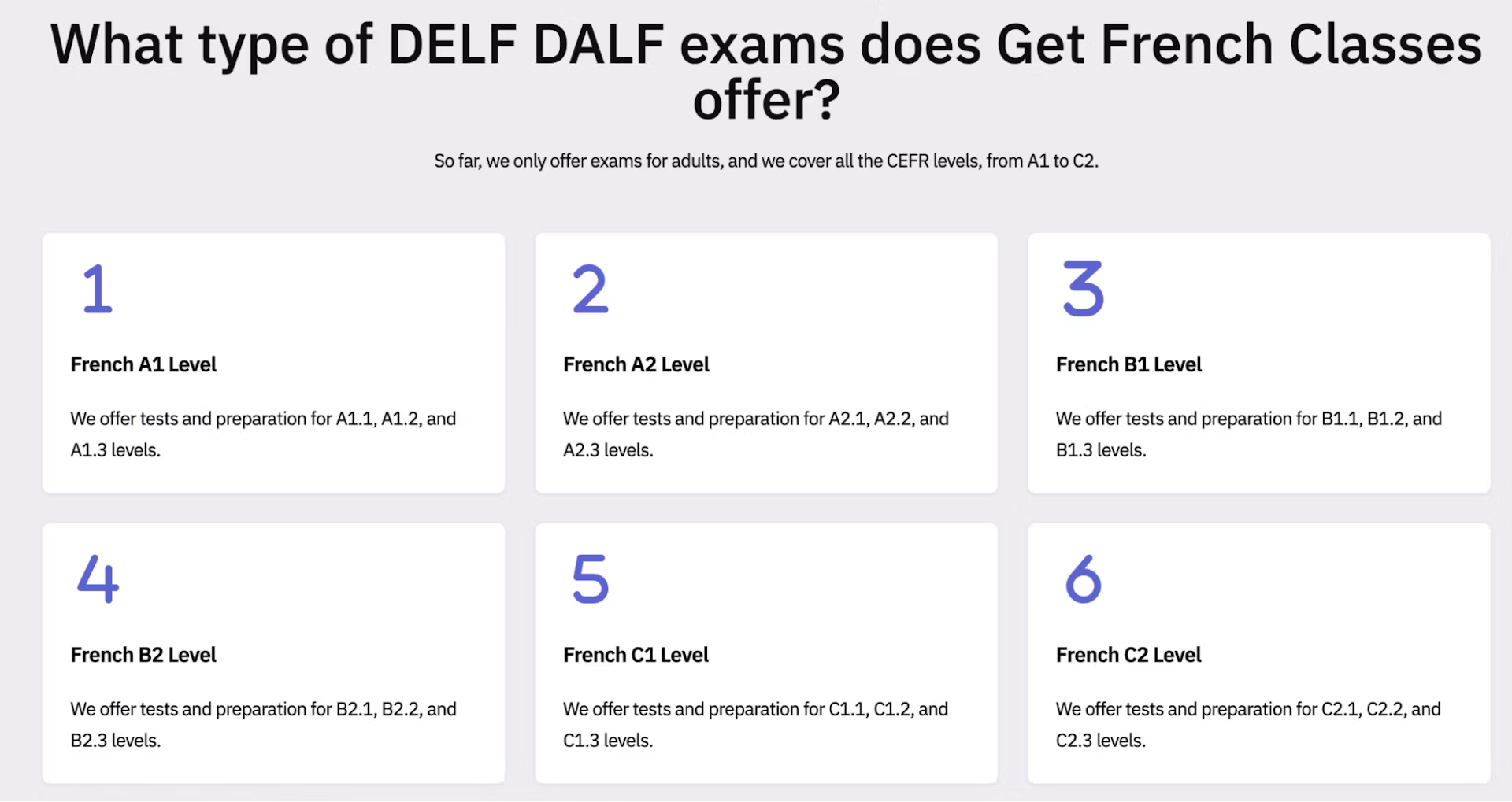
This approach ensures that when you receive a certificate from us, it truly represents your French language abilities.
It's not just proof that you've completed a course, but evidence that you can effectively use French at a specific level. This can be invaluable for academic applications, job prospects, or personal achievement. Here's what our learners say:

As a busy mom and professional, learning French has been complicated for me. But since I started learning with Get French Classes, I have seen my French improve FAST. Through the lessons, I not only get to practice every day, but I also have more opportunities than before. I can practice with my advisor, private tutor, and other learners like me.

What I like the most about the program is that all my tutors are native speakers. They do help me not only understand the French language, but also the culture and the nuances of some words and expressions. And mostly, the live sessions are engaging and fun.

I chose Get French Classes because their teaching materials and content are incredibly rich, going from everyday expressions to more specialized ones. I also get many opportunities to interact with tutors, and that has a huge impact on my fluency.
I've tried learning French on my own before, but nothing compares to this program. The combination of video lessons, live tutoring sessions, and group practice made learning French enjoyable and effective.
Is Lingoda worth it?
Look, Lingoda isn't perfect, but it's not a bad choice if you're serious about learning a language.
It's great for self-motivated learners who thrive on structure and can commit to regular classes. The native-speaking teachers and 24/7 availability are big pluses. But let's be real - it's pricey, and you won't become fluent just using Lingoda alone.
Now, if you're learning French, I've got to tell you about Get French Classes. We've taken what works on platforms like Lingoda and kicked it up a notch.
On top of live classes, we offer daily video lessons, assignments, and a supportive community. We built our platform to give you more practice time, more structured learning, and more bang for your buck.
Bottom line? Lingoda's solid, but if you're after French fluency, Get French Classes is where it's at. We're all about getting you to speak French confidently without breaking the bank.
Ready to learn a language like French with interactive learning experience? Then, happy learning! 😊
